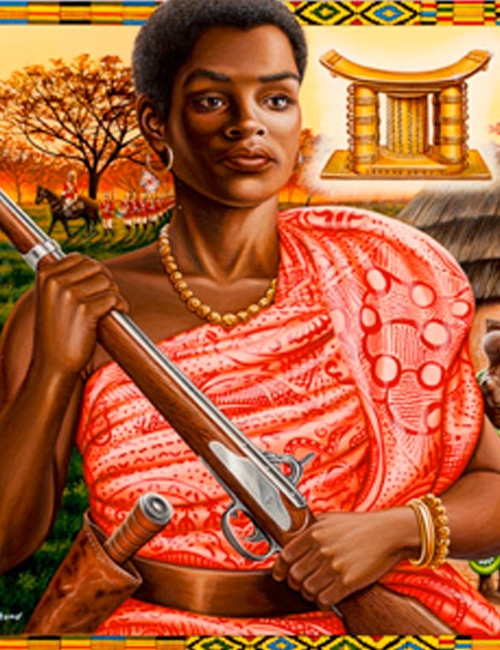Yaa Asantewaa was born in the 1840s to Kwaku Ampoma and Ata Po of Besease Clan, Ashanti Kingdom. She is famous for her intellectual leadership skills and for leading the Ashanti rebellion against British colonialism.

Photo credit: African history
In the 1880s, her brother, Nana(the title of a monarch) Akwasi Afrane Okpase, a powerful ruler of the Edwesu clan, appointed her to the role of Queen Mother (the second-highest position in the empire). The appointment complied with the matrilineal aspect of the Ashanti culture.
As the Queen mother, Asantewaa held responsibilities such as advising the king and presenting candidates for the position of chief whenever the need arose. Above all, she was the custodian of the Sikadwa (the Golden Stool): The Golden Stool is an emblem of the cultural system and power of the Ashanti kingdom.
Unfortunately, Nana Akwasi died in 1894 after the Ashanti civil war between 1883-1888. After his death, Yaa Asantemwaa used her influence as Queen Mother to nominate her grandson, Kofi Tene, as ruler of the Ejisu clan.
In 1896, the Ashanti people began to rebel against the British presence in their lands. To retaliate, British Governor Frederick Mitchell Hodgson captured and exiled King Agyeman Prempeh I of Asante Kingdom, his family and some chiefs among them, Nana Yaa Asantewaa’s grandson, Kofi Tene, to Sierra Leone and later to Seychelles. Hodgson aimed to acquire the Golden Stool and control the Asante Kingdom.
As the remaining chiefs were taking long deciding how to get back at the British, Nana Yaa formed a troop of over 5,000 soldiers, both men and women. She challenged the men that if they were not ready to defend their people, then the women would. The men's egos got bruised, and they rose to the occasion. Her passion and vigour at leadership earned her a role as the Chief Commander of the Ashanti army.
When Hodson sat on the Golden stool, he pushed the Ashanti to the edge, and hell broke loose! Starting March 28, 1900, Yaa Asantewaa led her people in a series of attacks named the Yaa Asantewaa War or the War of the Golden Stool. They raided the British fort at Kumasi, where the British had sought refuge.
The rebellion resulted in the death of 1,000 British and allied African soldiers and 2,000 Ashanti, with the totals higher than the deaths from all the previous wars combined. The war also challenged the traditional role of women and united the people.
Queen Yaa Asantewaa and about 15 of her closest advisors were captured during the war and sent into exile to Seychelles. The rebellion was the last of the Anglo-Asante wars that lasted throughout the 19th century. On January 1, 1902, the Asante empire became a protectorate of the British crown.
Queen Mother Yaa Asantewaa died in exile in Seychelles on October 17, 1921.
Agyeman Prempeh and the other exiled Asante members were allowed to return to their country three years later.
Asantehene Agyeman Prempeh I made sure the remains of Yaa Asantewaa and the other exiled Asantes were taken back to Kumasi for a proper royal burial. The dream to free her people from the British was finally realised when Ghana gained independence on March 6, 1957.
In 1960, Yaa Asantewaa Girls' Secondary was established in Kumasi in her honour to encourage more female leaders in Ghanaian society. In 2000, a week-long centenary celebration was held many years later to acknowledge her accomplishments.
On August 3, the same year, a museum was dedicated to her at Kwaso in the Ejisu–Juaben District. Unfortunately, a fire razed down the place, destroying several historical items, including her sandals and batakarikese (battle dress), on July 23, 2004.
There is also an achievement award, the Nana Yaa Asantewaa Awards (NYA), which honours women who uphold the values and leadership of Asantewaa.
Queen Mother Yaa Asantewaa remains a significant figure in Asante history and the history of Ghana as a country for her role in fighting for the rights of her people. She is praised in the song as follows:
Koo koo hin koo
Yaa Asantewaa ee!
Obaa basia
Ogyina apremo ano ee!
Waye be egyae
Na Wabo mmode
Translation
Yaa Asantewaa
The woman who fights before cannons
You have accomplished great things
You have done well
Additional Resources
Yaa Asantewa: Warrior Queen of Ghana
AFRICAN HEROES OF FREEDOM: QUEEN MOTHER YAA ASANTEWAA OF EJISU
Join the Lughayangu Community!

